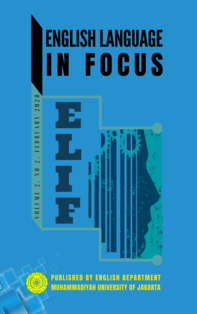ELT Comparison: Increasing Students Speaking Ability in Indonesia, South Korea, Russia, and Poland
DOI:
https://doi.org/10.24853/elif.2.2.131-140Keywords:
English language teaching, speaking skill, English educational students.Abstract
English as a global language facilitates the people to communicate with each other despite different lingua-cultures or accent. Communication will be something important to build the socio condition of civilians in every single country. This background of research leads to get to know about English Language Teaching (ELT) to the people whose first language is not English. Each country in Asia or Europe whose English is not their first language has its differences in teaching and learning about English. The four basic things of English, such as reading, writing, and speaking will be the challenges that they need to be faced. According to the basics of four skills, speaking is the hardest one for most non-native speakers. Therefore, the teachers need to have particular ways to teach about speaking to increase students’ skill ability in EFL countries. This research is aimed to show the differences and comparisons among Indonesian and South Korea as the representatives of Asia, also Russia and Poland as the representatives of Europe whose first language is not English. This purpose means that people can distinguish among different types in each country for teaching and learning English, moreover for speaking skills.References
Alemi, M., & Daftarifard, P. (2010). Pedagogical Innovations in Language Teaching Methodologies. Journal of Language Teaching and Research, 1(6). https://doi.org/10.4304/jltr.1.6.765-770
Bambang, U. W., & Cahyono, Y. (2006). The Teaching of EFL Speaking in the Indonesian Context: The State of the Art. Bahasa dan Seni, 34(2), 269–292. Retrieved from http://sastra.um.ac.id
Brown, H. D. (2004). Language Assessment Principles and Classroom Practices. San Fransisco: Longman.
Derwing, T. M., Diepenbroek, L. G., & Foote, J. A. (2012). How Well do General-Skills ESL Textbooks Address Pronunciation? TESL Canada Journal, 30(1), 22–44. Retrieved from https://files.eric.ed.gov/fulltext/EJ1001889.pdf
Hadi, M. S., & Izzah, L. (2018). Problem Based Learning (PBL) in Teaching English for Students of Primary School Teacher Education Department. English Language in Focus (ELIF), 1(1), 45–54. Retrieved from https://jurnal.umj.ac.id/index.php/ELIF/article/view/4501/3194
Harmer, J. (2015). The Practice of English Language Teaching. London: Pearson Education.
Henderson, A., & Jarosz, A. (2014). Desperately Seeking a Communicative Approach: English Pronun-ciation in a Sample of French and Polish Secondary School Textbooks. Research in Language, 12(3), 261–278. https://doi.org/10.2478/rela-2014-0015ï
Heredia, R. R., & Altarriba, J. (2001). Bilingual Language Mixing: Why Do Bilinguals Code-Switch? Current Directions in Psychological Science, 10(5), 164–168. https://doi.org/10.1111/1467-8721.00140
Jambor, P. Z. (2011). English Language Necessity: What it means for Korea and non-English speaking countries. Online Submission. Retrieved from https://eric.ed.gov/?id=ED528279
Jenkins, J. (2006). Current Perspectives on Teaching World Englishes and English as a Lingua Franca. TESOL Quarterly, 40(1), 157. https://doi.org/10.2307/40264515
Kayi, H. (2006). Teaching Speaking: Activities to Promote Speaking in a Second Language (TESL/TEFL). The Internet TESL Journal, 12(11). Retrieved from http://iteslj.org/Techniques/Kayi-TeachingSpeaking.html
Kirkpatrick, A. (2007). World Englishes: Implications for International Communication and English Language Teaching. Cambridge: Cambridge University Press.
McKay, S. L. (2003). Teaching English as an International Language: Rethinking Goals and Perspectives. The Electronic Journal for English as a Second Language, 7(1). Retrieved from http://www.tesl-ej.org/wordpress/issues/volume7/ej25/ej25r5/
O’Malley, J. M., & Chamot, A. U. (1990). Learning Strategies in Second Language Acquisition. Learning Strategies in Second Language Acquisition. Cambridge University Press. https://doi.org/10.1017/cbo9781139524490
Qureshi, I. A. (2012). The Importance of Speaking Skills for EFL Learners. Retrieved from https://upload.wikimedia.org/wikipedia/commons/e/e3/Speaking_Skills.pdf
Rasskazova, T., Guzikova, M., & Green, A. (2017). English Language Teacher Development in a Russian University: Context, Problems and Implications. Ampersand, 4, 1–9. https://doi.org/10.1016/j.amper.2017.01.001
Richards, J. C. (2008). Teaching Listening and Speaking: From Theory to Practice. New York: Cambridge University Press.
Rizqiningsih, S., & Hadi, M. S. (2019). Multiple Intelligences (MI) on Developing Speaking Skills. English Language in Focus (ELIF), 1(2), 127–136. Retrieved from https://jurnal.umj.ac.id/index.php/ELIF/article/view/4521/3206
Seidlhofer, B. (2004). Research Perspectives on Teaching English as a Lingua Franca. Annual Review of Applied Linguistics, 24, 209–239. https://doi.org/10.1017/s0267190504000145
Taie, M. (2015). English Language Teaching in South Korea: A Route to Success? Theory and Practice in Language Studies, 5(1), 139. https://doi.org/10.17507/tpls.0501.19
Ur, P. (1996). A course in English Language Teaching. Cambridge: Cambridge University Press.
Downloads
Published
Issue
Section
License
Authors who publish with this journal agree to the following terms:
- Authors retain copyright and grant the journal right of first publication with the work simultaneously licensed under a Creative Commons Attribution License that allows others to share the work with an acknowledgment of the work's authorship and initial publication in this journal.
- Authors can enter into separate, additional contractual arrangements for the non-exclusive distribution of the journal's published version of the work (e.g., post it to an institutional repository or publish it in a book), with an acknowledgment of its initial publication in this journal.
- Authors are permitted and encouraged to post their work online (e.g., in institutional repositories or on their website) before and during the submission process, as it can lead to productive exchanges, as well as earlier and greater citation of published work (See The Effect of Open Access).


